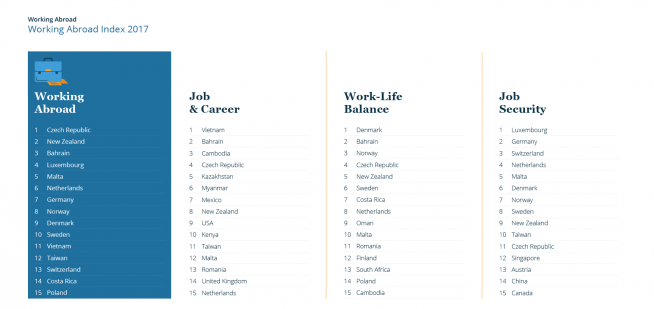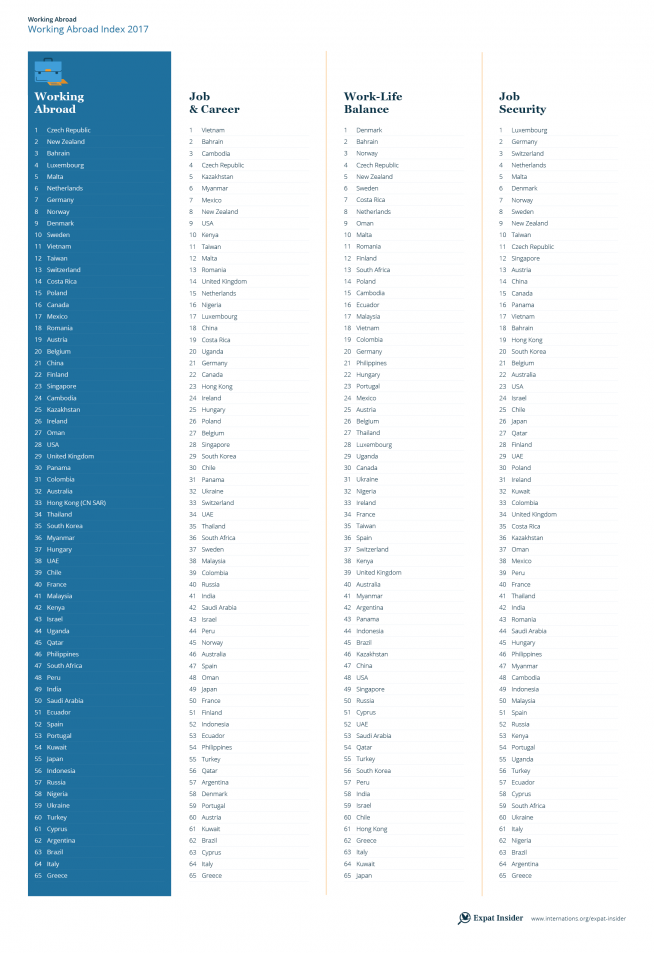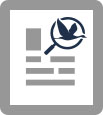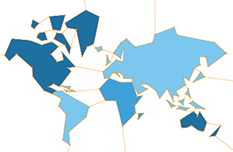Finding the Balance: Where Working Expats Are Happiest
- #1 Czech Republic ranks very well for job security.
- #2 New Zealand offers a shorter working week and a healthy work-life balance.
- #3 Bahrain is the top place for working expat women and has high job satisfaction.
- Biggest winners: Kazakhstan, Ireland, and Finland.
- Biggest losers: Luxembourg, Taiwan, and Germany.
Methodology
In 2017, there are 65 countries in the Working Abroad Index. Although the minimum sample size for a destination to be included is 75 respondents, over 45 countries have more than 100 respondents. Respondents were asked to rate their satisfaction with various factors in three areas (Job & Career, Work-Life Balance, and Job Security) on a scale of one to seven: four is neutral and seven is the highest possible rating.
Czech Republic: Flexibility and Job Security
For the second consecutive year the Czech Republic has increased its ranking in the Working Abroad Index, claiming the number one spot in 2017. Three-quarters of respondents are satisfied with their jobs, eleven percentage points more than the global average of 64%. About two in three expats (65%) also rate their career opportunities positively (global average: 53%).
This is not a country of workaholics.
Over three-quarters of respondents (76%) are satisfied with the time spent working. Despite expats with a full-time job working an average of 44.9 hours per week, only 9% voice any dissatisfaction with their working hours (global average: 20%). The Czech Republic also ranks among the global top 10 for work-life balance; one US American expat said that “this is not a country of workaholics”.
Expats in the Czech Republic are more likely to take their career into their own hands than in other parts of the world: 7% are self-employed professionals, such as doctors, lawyers, or accountants (global average: 4%), and 8% are freelancers (global average: 5%). Another 8% describe themselves as entrepreneurs or business owners. Many expats also work in education (19%), with one in ten respondents describing themselves as a teacher, academic, or researcher.
Despite the higher percentages of freelancers and self-employed expats, respondents rate the country highly for job security, with the Czech Republic ranking second in this aspect. Expats also have confidence in the economy, with 78% regarding it favorably and 56% considering it a potential benefit prior to moving.
New Zealand: A Balanced Approach to Work
With three-quarters of respondents saying they are generally satisfied with their job, it’s no surprise that New Zealand is in the top 10 in every subcategory of the Working Abroad Index, coming in second place overall.
Working expats in New Zealand are more likely to be doing so in the public sector (14%) or healthcare (15%) than in other parts of the world (global average: 4% and 6% respectively). This might be linked to the official Skills Shortages lists: those with medical training are actively encouraged to move to New Zealand; for example, the country may need as many as 25,000 more nurses by 2030.
Expats in New Zealand are particularly happy with their work-life balance, with close to three in ten (29%) saying they are completely satisfied — ten percentage points more than the global average (19% completely satisfied, 60% generally satisfied).
Lower-than-average working hours might be among the potential reasons for this high degree of satisfaction. Full-time workers in New Zealand spend an average of 42.3 hours at work, two hours less than the average survey respondent (44.3 hours). Expats in New Zealand are also more likely to be working part time, with almost three in ten (27%) choosing this path compared to 17% worldwide.
Like their counterparts in the Czech Republic, expats in New Zealand feel secure in their jobs; seven in ten respondents are satisfied with job security compared to 57% worldwide, putting the country in fourth place for job security.
Though exports have been slowly declining in recent years, increased government spending following natural disasters as well as increased revenue from tourism has led to moderate economic growth. This is reflected in the Expat Insider 2017 survey with 77% of respondents in New Zealand giving the economy a positive rating.
Bahrain: Top Choice for Women
The 2017 winner in the overall ranking is also a top destination for expats looking to build their career. Bahrain ranks second in both the Job & Career and Work-Life Balance subcategories and was also the overall number one in the Working Abroad Index among expat women.
When it comes to job satisfaction, 73% of expats in Bahrain say they are generally satisfied with their jobs, and 36% are completely satisfied — 19 percentage points more than the global average (17%). Three in five are also positive about their career prospects, with only 18% of respondents rating this aspect negatively.
You can still find time to relax after a day's work.
The country also makes it into the top 3 for working hours and work-life balance. Among working expats, 93% work full time, spending an average of 42.9 hours a week at work (global average: 44.3 hours). The majority of expats in Bahrain is happy with their work-life balance (69%), and a significant 35% say they are completely satisfied with this aspect of expat life. One respondent from the Philippines likes that “you can still find time to relax after a day's work”.
What seems to have held Bahrain back in this index is economic uncertainty. Low oil prices have resulted in curbed government spending and higher levels of national debt. Though Bahrain ranks considerably lower for the state of the economy than for other factors (25th out of 65 destinations), 61% of respondents still give it a positive rating.
Winners and Losers
The Working Abroad Index winner in 2016, Luxembourg, dropped to fourth one year later; it slipped down the rankings for both job satisfaction (6th to 16th) and career prospects (9th to 15th). Another notable change was in working hours: between 2016 and 2017 there was an 114-minute increase in the average full-time working hours from 41.8 hours a week to 43.7 hours. However, this is still below the global average of 44.3 hours a week for full-time employees.
Taiwan — 2016’s number two — also struggled in 2017. Though its scores are lower across all subcategories, the decline is particularly pronounced in work-life balance, where it fell from 5th place in 2016 to 35th in 2017. Interestingly, however, the average full-time working hours actually decreased by 90 minutes, from 44.6 to 43.1 per week.
One of the biggest winners in the Working Abroad Index is Kazakhstan, which jumped from 57th place in 2016 to 25th in 2017. It even leaped 51 places to take the top spot for career prospects, as well as making significant gains in job security (from 40th in 2016 to 9th in 2017). This might be due to economic diversification, which has led to job opportunities in construction and education, as well as traditional fields like oil and natural resources.
Former two-time winner of the general country ranking, Ecuador, suffered in the Working Abroad Index, falling from 30th to 51st place. Though it dropped in all subcategories, the biggest decline was in the career prospects ranking factor: 40% of respondents say they are generally unsatisfied with their career options, significantly more than the global average (26%). A decline across almost all metrics also saw Australia fall from 10th to 32nd place. However, the biggest overall loser is Panama, where respondents are less satisfied with their job, working hours, and work-life balance, causing it to drop 24 places to take 30th place.
Full Ranking
Further Reading
- New Zealand Immigration: Healthcare Jobs
- OECD: Economic Forecast Summary: New Zealand OECD Economic Outlook November 2016
- The World Bank: Bahrain’s Economic Outlook – July 2016
- The Astana Times: Construction, Education, Energy Are Areas Attracting Foreigners to Kazakhstan
- Expat Insider 2017 — The Best & Worst Places for Expats
- Expat Insider 2017 — Oceania: A Happy Expat Life Comes at a Price
- Expat Insider 2017 — Highs and Lows in the GCC States
- Expat Insider 2017 — Playing Happy Families in the Czech Republic
- Expat Insider 2016 — The Best Places for Expats to Build Their Career
- Expats in the Czech Republic
- Expats in New Zealand
- Expats in Bahrain





